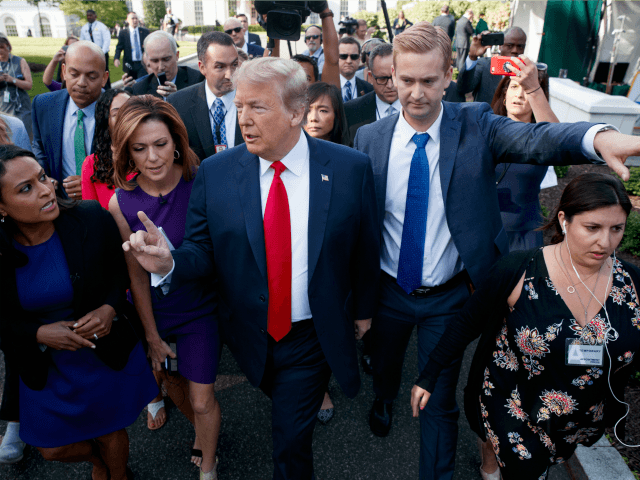President Donald Trump will meet with House GOP legislators on Tuesday to talk about the two pending amnesty bills in the House, White House officials say.
Trump will likely use the meeting to show legislators that he is willing to take the political gamble of supporting the two bills, both of which combine sweeping changes in immigration laws plus cuts to immigration numbers with an unpopular amnesty.
The first bill offers work-permits for 700,000 illegals, and the so-called “moderate” bill offers amnesty to a population at least 1.8 million illegals plus green cards for a few hundred thousand foreign guest-workers.
Both bills implement most of Trump’s Four Pillars reform because they are written by the same team of staffers in the House judiciary committee, chaired by Rep. Bob Goodlatte. The bills provide $25 billion for a border wall, closure of several border-wall loopholes, cuts to chain-migration, and end the diversity visa lottery.
Both bills cut immigration by at least two million foreigners over the next decade, even as they also redistribute the freed-up green cards from the excluded migrants to the resident population of illegals and guest-workers.
However, Trump repeatedly denounced an amnesty during his pro-American campaign in 2016 — and the populist reaction to his support for the bills may wreck his 2018 midterm plans and sink him in 2020.
Both bills are opposed by NumbersUSA and the Federation for American Immigration Reform.
House leaders have scheduled fast-track votes for Thursday, after releasing the second bill on June 15.
Even if the House Speaker Paul Ryan pushes either of the bills through the House, the bills cannot get through the Senate without support from 60 Senators.
That high number means a bill has to be backed by roughly 10 Democratic Senators plus nearly all of the GOP’s cheap-labor caucus, which includes at least 20 Senators out of the 51 GOP members in the Senate.
The GOP’s cheap-labor caucus is led by South Carolina’s Sen. Lindsey Graham and North Caroline’s Sen. Thom Tillis, but it also includes Sen. Collins from Maine, Sen. Mike Rounds from South Dakota, Sen. Ron Johnson from Wisconsin, and many other Senators.
The caucus will likely demand huge changes to Goodlatte’s bills to ensure that millions of additional immigrant workers, consumers, and renters are provided to U.S. businesses over the next several years. If those changes are approved the House and Trump, the extra inflow will lower wages, raise rents, boost Wall Street and prove that the GOP is dominated by employers and investors, not by employees and voters.
The vast majority of the Democratic caucus will oppose the legal reforms and the immigration-cuts in the bills because they and their business donors and ethnic-lobby allies want high levels of immigration into the United States, regardless of the damage done to Americans’ wages and communities.
Amnesty advocates rely on business-funded “Nation of Immigrants” push-polls to show apparent voter support for immigration and immigrants.
But “choice” polls reveal most voters’ often-ignored preference that CEOs should hire Americans at decent wages before hiring migrants. Those Americans include many blue-collar Blacks, Latinos, and people who hide their opinions from pollsters. Similarly, the 2018 polls show that GOP voters are far more concerned about migration — more properly, the economics of migration — than they are concerned about illegal migration and MS-13, taxes, or the return of Rep. Nancy Pelosi.
Four million Americans turn 18 each year and begin looking for good jobs in the free market — but the government provides green cards to roughly 1 million legal immigrants and temporary work-permits to roughly 3 million foreign workers.
The Washington-imposed economic policy of economic growth via mass-immigration shifts wealth from young people towards older people by flooding the market with foreign labor. That process spikes profits and Wall Street values by cutting salaries for manual and skilled labor offered by blue-collar and white-collar employees. The policy also drives up real estate prices, widens wealth-gaps, reduces high-tech investment, increases state and local tax burdens, hurts kids’ schools and college education, pushes Americans away from high-tech careers, and sidelines at least 5 million marginalized Americans and their families, including many who are now struggling with opioid addictions.

COMMENTS
Please let us know if you're having issues with commenting.